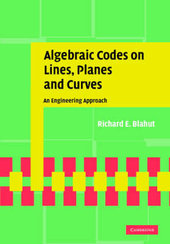
|
Algebraic Codes on Lines, Planes, and Curves: An Engineering Approach
Hardback
Main Details
| Title |
Algebraic Codes on Lines, Planes, and Curves: An Engineering Approach
|
| Authors and Contributors |
By (author) Richard E. Blahut
|
| Physical Properties |
| Format:Hardback | | Pages:576 | | Dimensions(mm): Height 254,Width 179 |
|
| Category/Genre | Electrical engineering |
|---|
| ISBN/Barcode |
9780521771948
|
| Classifications | Dewey:621.38220151635 |
|---|
| Audience | | Professional & Vocational | |
|---|
| Illustrations |
86 Line drawings, unspecified
|
|
Publishing Details |
| Publisher |
Cambridge University Press
|
| Imprint |
Cambridge University Press
|
| Publication Date |
3 April 2008 |
| Publication Country |
United Kingdom
|
Description
The past few years have witnessed significant developments in algebraic coding theory. This book provides an advanced treatment of the subject from an engineering perspective, covering the basic principles and their application in communications and signal processing. Emphasis is on codes defined on the line, on the plane, and on curves, with the core ideas presented using commutative algebra and computational algebraic geometry made accessible using the Fourier transform. Starting with codes defined on a line, a background framework is established upon which the later chapters concerning codes on planes, and on curves, are developed. The decoding algorithms are developed using the standard engineering approach applied to those of Reed-Solomon codes, enabling them to be evaluated against practical applications. Integrating recent developments in the field into the classical treatment of algebraic coding, this is an invaluable resource for graduate students and researchers in telecommunications and applied mathematics.
Author Biography
Richard E. Blahut is Head of the Department of Electrical and Computer Engineering at the University of Illinois, Urbana Champaign, where he is also a professor. He is a Fellow of the IEEE and the recipient of many awards including the IEEE Alexander Graham Bell Medal (1998), the Tau Beta Pi Daniel C. Drucker Eminent Faculty Award, and the IEEE Millennium Medal. He was named Fellow of the IBM Corporation in 1980, where he worked for over 30 years, and was elected to the National Academy of Engineering in 1990.
Reviews"... a rich, detailed, but fundamentally elementary take on material previously available only to specialists... will be valuable for academic libraries." D.V. Feldman, University of New Hampshire for Choice Magazine
|